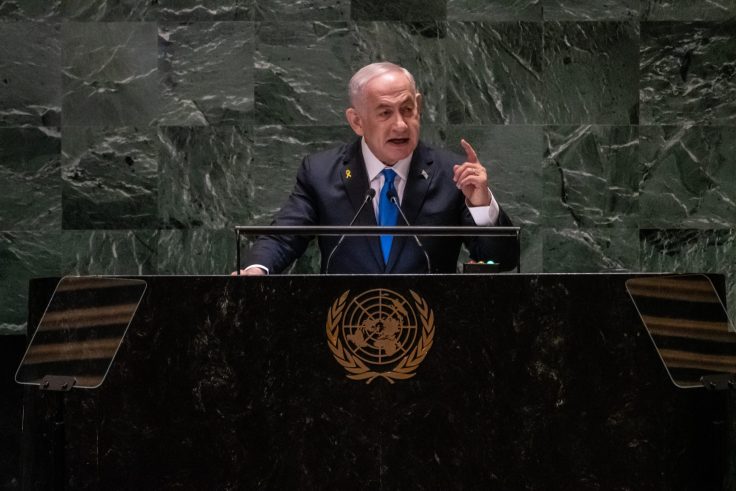Last Time Iran Attacked, the Biden-Harris Admin Held Back Israel’s Response. This Time, the Jewish State Will ‘Not Be Deterred.’

Israel’s war cabinet met Wednesday to plot its “harsh response” to Iran’s recent ballistic missile barrage, all but solidifying an impending—and significant—retaliatory strike on Tehran. The Jewish state, under pressure from the Biden-Harris administration, refrained from executing such a strike in the wake of Iran’s April attack. This time, it will not be deterred, a U.S. official briefed on the matter told the Washington Free Beacon.
“We see indications that Israel will likely not be deterred from an appropriate response this time around,” the official said. “The Biden-Harris administration foolishly held Israel back after Iran’s missile attack in April, and now we see the result.”
While the exact contours of Israel’s war plans remain fuzzy, current and former U.S. officials said the White House will not be able to hold back Israel from striking key Iranian military sites, oil infrastructure, missile depots, air defense systems, and potentially its contested nuclear sites.
That marks a departure from April when President Joe Biden urged Prime Minister Benjamin Netanyahu to “take the win” and scale back Israel’s response to an Iranian missile and drone attack that the Jewish state and its allies swatted away. Though Netanyahu did strike Iran at the time, the response was muted and played down by Tehran.
“Iran made a big mistake, and it will pay for it,” Netanyahu said shortly after Iran’s Tuesday attack. “The regime in Iran does not understand our determination to defend ourselves and our determination to retaliate against our enemies.”
Hours later, on Wednesday, Israel’s war cabinet assembled and promised a “harsh response” to Iran’s massive strike on the country, which saw more than 180 ballistic missiles target the Jewish state. Israeli military officials are now gathering information on key sites across Iran and are reportedly interested in striking Tehran’s oil facilities, a key source of revenue for the hardline regime.
Other sites on Israel’s radar include the weapons factories that made the ballistic missiles used in Tuesday’s attack, as well as Iran’s air defense, according to former U.S. officials who spoke to the Free Beacon. By taking out these sites, Israel could pave the way for subsequent attacks on a range of key Iranian military strongholds.
“You remove the regime’s most important threats and strategic capabilities,” said Richard Goldberg, a former White House National Security Council member who worked on the Iran portfolio. “This doesn’t have to be one and done. This is a longer-term process where you ensure their most dangerous threats are eliminated first, and then you work on longer-term threats.”
In addition to hitting the regime’s central revenue sources, Israel is likely eyeing a range of sites used by Iran’s Islamic Revolutionary Guard Corps, the country’s elite terror force. Many of the IRGC’s most significant sites are already sanctioned by the United States, making it easy for Israel to assemble intelligence on the most important strategic outposts.
“All of it,” Goldberg said, “is now fully empowered by the elimination of Hassan Nasrallah and the decimation of Hezbollah. It’s a brand new strategic paradigm for Israel because they’re no longer living in fear of a Hezbollah response.”
Israel has also made clear in recent weeks that it has the ability to wage sophisticated cyber attacks. Its opening salvo against Hezbollah last month included a daring intelligence operation that caused the terror group’s pagers and handheld radios to explode simultaneously, wounding thousands of fighters.
“A combination of kinetic strikes and cyber attacks could result in a substantial blow to the regime in Tehran,” said Joe Truzman, a senior research analyst at the Foundation for Defense of Democracies think tank. “Israeli covert operations against military leaders who carried out the strikes on Tuesday should not be discounted either.”
President Joe Biden is nonetheless working to minimize Israel’s response, saying publicly on Wednesday that he does not support an attack on Iran’s nuclear program. This establishes a fresh U.S. red line meant to handicap Israeli war planners as they assemble a list of strategic targets.
“We’ll be discussing with the Israelis what they’re going to do,” Biden said, adding that Israel has “a right to respond, but they should respond proportionally.”
In its pursuit to further degrade Hezbollah’s capabilities, including its remaining stockpiles of advanced Iranian missiles, Israel has been conducting cross-border ground raids meant to pave the way for a “limited, localized, and targeted ground offensive.”
Hezbollah launched more than 240 missiles on Israel’s northern territories Wednesday morning, suggesting the terror group is still interested in escalation even after its entire senior leadership was wiped out by Israeli airstrikes over the past two weeks. At least eight Israeli soldiers have been killed so far during limited ground operations.
Amid the northern conflict and a continued threat from Hamas in the Gaza Strip, Israel has shown it can wage a multi-front war that is now expected to reach Iran, the source of all terrorism against Israel.
“There is no free pass this time. Israel is going to respond,” said David Schenker, a former Department of Defense official who most recently served as head of the State Department’s Near Eastern Affairs bureau.
“I anticipate Israel will want to do something meaningful,” Schenker said, noting that Iran’s oil sites are an attractive target for an initial Israeli strike.
For other regional analysts, the Biden-Harris administration’s bid to dissuade Israel from hitting Tehran’s nuclear sites represents a “misguided” foreign policy that will only embolden Iran’s regime.
“The president should not be saying this publicly as it undermines American deterrence against Iran at a time when its nuclear program is galloping ahead,” said Jason Brodsky, a former Senate aide who serves as policy director at United Against a Nuclear Iran. “Israel must escalate here, and its response should be disproportionate.”




